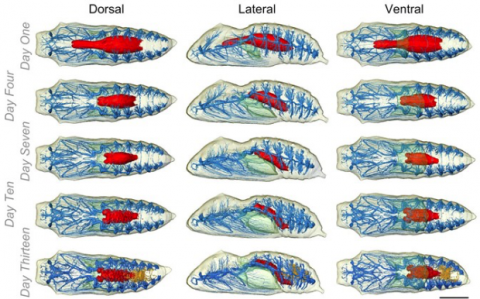RWDevCon Inspiration Talk – Identity by Alexis Gallagher
Alexis shares his thoughts on identity, taking ideas from moral philosopy and programming and examining them through the lens of his own experiences. By Alexis Gallagher.
Sign up/Sign in
With a free Kodeco account you can download source code, track your progress, bookmark, personalise your learner profile and more!
Create accountAlready a member of Kodeco? Sign in
Sign up/Sign in
With a free Kodeco account you can download source code, track your progress, bookmark, personalise your learner profile and more!
Create accountAlready a member of Kodeco? Sign in
Contents
RWDevCon Inspiration Talk – Identity by Alexis Gallagher
25 mins
- Transcript
- Derek Parfit Defines The Transporter Problem
- Defining Terms To Help Us Understand The Problem
- Am I The Same Me?
- Clojure Defines An Identity As Having Many States
- So What Is Identity?
- From My Own Experience
- My Childhood Identity
- Is Your Identity Destroyed Or Just Changed?
- I Feel Like An Impostor
- Three Claims To Assist In Moving Forward
Is Your Identity Destroyed Or Just Changed?
I’m going to quote for Derek Parfit once more, when he’s discussing different kinds of identity. He describes one possible notion here: “Suppose that an artist paints a self-portrait, and then by repainting turns this into a portrait of this father. Even though these portraits are more similar than a caterpillar and a butterfly, they are not stages in the continued existence of a single painting.”
“The self-portrait is a painting that the artist destroyed. In a general discussion of identity, we would need to explain why the requirements of physical continuity differs in such ways for different kinds of things.”
Parfit dismisses that notion of identity. He raises it just to blow it off as being irrelevant for people, because he’s got this very philosophical thing he’s trying to get to, a person as a kind of object, and what does that mean?
Actually, that description strikes me as a very evocative description of the normal process of aging and moving through life. Your story about yourself changes. You erase pieces of yourself.
If the changes are big enough, you are likely to feel that you have become a new kind of thing at some point. Are you being turned into a butterfly, or are you being destroyed?
Or, is it the same thing? How do you know?
These are CT scans of a caterpillar in its chrysalis.
I think if you asked a caterpillar if it wanted to do this before the process started, it would probably say, “No thank you.” It would say, “This looks like what you are describing is severe damage to my internal organs over ten days. This is a bad idea.”
To be honest, frustration and disappointment is also part of this story, part of how we interpret these things. I’m sure if had been walking around San Francisco and I met my 16-year-old self, his reaction would be, “What? You’re not a physicist? What happened?”
At the same time, he’d also think iPhones were pretty cool. iPhones didn’t exist when I was 16. It really doesn’t seem like he had all the information necessary to make all the decisions about how my life was supposed to go and how the world is supposed to be.
I Feel Like An Impostor
This also reminds me of discussions you see about impostor syndrome.
This usually comes up in the context of groups that are under-represented in technology, but of course, it’s a universal experience of the human condition:
- feelings of self-alienation
- feelings of personal frustration
- feelings of people not understanding you
- feelings of the context not being right for you in some way
These feelings are available to everybody.
For me, personally, I could tell you that roughly every four to six months I have this experience. I am working on something and I have the feeling when I’m working with software that I have no idea what I’m doing because I discover something where I realize it was very basic, and I should have known it, and somehow I never managed to learn it so far. At those moments, I have feelings of paranoia and frustration and anger with myself that I still don’t know how to do this stuff right.
Then I reflect that every four to six months I’m doing something substantially new, so I’m always operating in an area where, to some extent, I don’t know what I’m doing. It’s a big world. That’s part of it.
That doesn’t change the feeling. I just need to notice the feeling and not take it too seriously and remind myself that there are other reasons to believe I’m not an idiot, even though I feel like I’m an idiot at those points.
Part of me still wonders, would I feel more real, would I not have these feelings, if I had dramatic hair and was an alpha nerd in a black and white photo? The alpha nerd snapshots don’t feel what it feels like inside the snapshot.
Even Feynman in his books writes about periods of feeling like an impostor when he was starting his teaching responsibilities for the first time and was also trying to do research and was developing a curriculum. He writes about running away into the library and reading fairy tales of One Thousand And One Nights because he was too stressed out by it all.
Three Claims To Assist In Moving Forward
What does all this add up to? Let me try to wrap it up with three claims I can offer.
So don’t waste time feeling like an impostor. If at this moment, you are doing the work, then you are actually doing the work. It’s as simple as that.
There’s no use resisting change because it’s still happening. Every moment, the cells inside you are being modified and recycled and some are dying. The matter that are constituted of, some of that you are shedding. You are taking in new matter as you eat.
You are being destroyed and re-created moment-to-moment even if you are just standing still. Even if you do not step into the transporter, time is a transporter. It’s destroying and re-creating you.
- Claim #1: Identity is a perspective. It’s a slippery concept. It’s surprisingly hard to pin down in any objective way. In the world, we impose identity on things by deciding to see them as connected through time. It’s not that different in our hearts. We tell stories about ourselves to tie our lives together into one thing. We feel about as coherent about as ourselves as we decide to feel.
-
Claim #2: Reality is the moments. However you end up defining identity, the brute fact that you are working with, the little atoms or values that you are tying together, or the snapshots, the moments; this is what’s actually there. This is what we can be certain of.
So don’t waste time feeling like an impostor. If at this moment, you are doing the work, then you are actually doing the work. It’s as simple as that.
-
Claim #3: Time is a transporter. Whatever your wishes, whatever your plans for yourself, you will change along the road. You will change a lot. Eventually you will die, which is a very big change.
There’s no use resisting change because it’s still happening. Every moment, the cells inside you are being modified and recycled and some are dying. The matter that are constituted of, some of that you are shedding. You are taking in new matter as you eat.
You are being destroyed and re-created moment-to-moment even if you are just standing still. Even if you do not step into the transporter, time is a transporter. It’s destroying and re-creating you.
My advice, and I realize this sounds very cheesy, but I believe it, is to embrace that. Step into the transporter, press the green button, go somewhere new. Go to Mars.
You don’t have a choice because you are moving forward anyway.
That’s my thought on identity.


